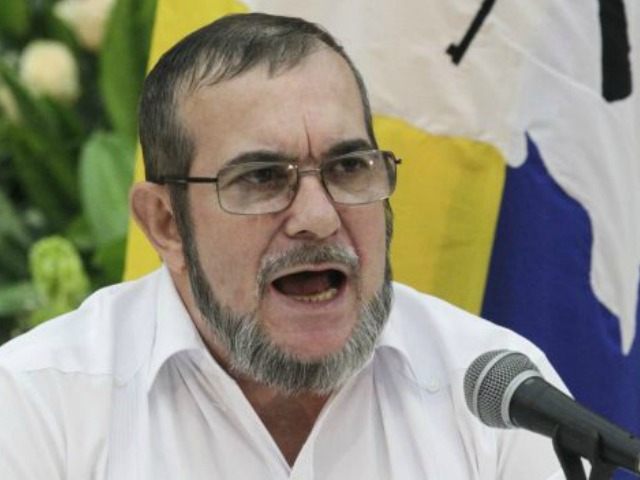The Revolutionary Armed Forces of Colombia (FARC), a Marxist terrorist group recently empowered by an Obama-supported peace deal with the Colombian government, has issued a statement in support of the socialist dictatorship in Venezuela, condemning the United States for allegedly meddling in the South American nation.
The head of the FARC, a terrorist who goes by the alias “Timochenko,” published an essay on the group’s website supporting dictator Nicolás Maduro and “the Bolivarian revolution,” describing the wave of protests against socialism as a “criminal onslaught.” Timochenko goes on to equate the decline of socialist Venezuela with the invasion of Iraq, blame the United States for the creation of al-Qaeda, and express support for Syrian dictator Bashar al-Assad before mentioning Nicolás Maduro.
Instead, most of the essay focuses on hero worship of late dictator Hugo Chávez. “For the first time, a government had knocked on their [the poor’s] doors to invite them to participate in the country’s political life, to organize and struggle for their vindication,” Timochenko writes of the early days of the “Bolivarian Revolution.”
“The United States will do the impossible to regain control of the world’s largest oil reserves,” he continues, suggesting that the United States ever had sovereignty over Venezuela. “It has been eighteen years of permanent sabotage, of blows and traps delicately woven to generate the impression that the bad guys are anyone but them,” he writes of the United States.
“Amid such confusion generated from the heights of the great capital… the FARC cannot be silent hoping to seek sympathy,” he concludes. “We support Nicolás Maduro Moros and the Bolivarian Revolution, we denounce the criminal onslaught of which they are victims, we call the Colombian people to not let themselves be fooled.”
Unlike his effusive praise of Chávez, Timochenko says of Maduro, “no human work is perfect and surely, some errors may have been committed that can be repaired and overcome.”
The FARC has been active for more than half a century in Colombia and Latin America as a guerrilla terrorist group and drug trafficking operation, considered for years the wealthiest non-jihadist terrorist organization in the world.
Timochenko and the rest of the FARC leadership have resided in Havana, Cuba, since the tenure of Colombian President Álvaro Uribe, who conducted a joint operation with the United States using counterterrorism techniques to dramatically reduce the FARC’s influence in the country.
FARC leaders in Cuba participate in communist marches and have received celebrity status among the leadership. Similarly, under Chávez, the FARC established a foothold in Venezuela, celebrating their 50-year anniversary there in 2014 under Maduro.
Despite Timochenko’s tepid support for Maduro personally, members of Maduro’s family have been caught attempting to traffic cocaine into the United States, claiming they received the drugs from FARC terrorists. Liberated FARC captives have claimed their kidnappers in Colombia knew to seek refuge in Venezuela if possible, where they would be welcomed.
The FARC has gained a second wind following Uribe’s tenure under current Colombian president Juan Manuel Santos, who has endeavored to reach a peace agreement with the terrorist group. Santos approved the deal through the Congress following a referendum in which Colombians, particularly in the rural areas where FARC operates, rejected the deal.
The agreement would require FARC terrorists – many of them abducted and turned into child soldiers – to hand over their weapons and face an independent tribunal, then slowly be reintegrated into society. Those found guilty of only “political crimes,” a vaguely defined category, would not have to serve prison time. Leaders like Timochenko could also run for office in a near future, using the drug profits the group continues to generate.
The agreement is not only unpopular with Colombian citizens, but with many rank and file FARC terrorists, as well, who fear that their leadership is selling them out in order to form a viable Marxist political party. Other criminal organizations, like Brazil’s First Central Command (PCC) drug gang, have been offering work to FARC terrorists, arguing that they will never evolve into a political entity that sheds its drug trafficking ways.

COMMENTS
Please let us know if you're having issues with commenting.